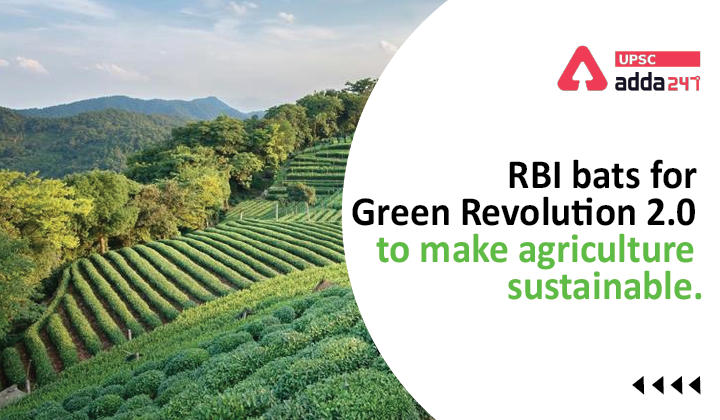Table of Contents
RBI report on Indian Agriculture: Relevance
- GS 3: Major crops-cropping patterns in various parts of the country, – different types of irrigation and irrigation systems storage, transport and marketing of agricultural produce and issues and related constraints; e-technology in the aid of farmers.
Indian Agriculture Report: Context
- Recently, RBI has released a new article named ‘Indian Agriculture: Achievements and Challenges’ and has said that India needs a second green revolution to make agriculture more climate-resistant and environmentally sustainable.
Indian Agriculture: Key points
- The article said that Indian agriculture has exhibited remarkable resilience during the COVID-19 period and the new emerging challenges warrant a second green revolution along with next-generation reforms.
- The article said that Indian agriculture scaled new heights with record production of various food grains, commercial and horticultural crops.
- The sector has exhibited resilience and ensured food security during the COVID-19 period.

Challenges to Indian agriculture
- Lower crop productivity: Crop productivity in India is much lower than other advanced and emerging market economies due to various factors, like fragmented landholdings, lower farm mechanisation and lower public and private investment in agriculture.
- Environmental concerns: Overproduction of crops like rice, wheat and sugarcane, has led to rapid depletion of the ground-water table, soil degradation and massive air pollution.
- Food inflation: Despite surplus production in many of the commodities, food inflation and volatility in prices continue to remain high causing inconvenience to consumers and low and fluctuating income for farmers.
RBI report on Indian agriculture: Recommendations
- Second green revolution: The above challenges would require a second green revolution focussed on the agriculture water-energy nexus, making agriculture more climate resistant and environmentally sustainable.
- Using biotechnology: The use of biotechnology and breeding will be important in developing eco-friendly, disease-resistant, climate-resilient, more nutritious and diversified crop varieties
- Digital technology and extension services: Wider use of digital technology and extension services will be helpful in information sharing and generating awareness among the farmers.
- Managing post-harvest loss and formation of FPO: The article also highlighted that better post-harvest loss-management and a revamp of co-operative movement through the formation of farmer-producer organisations (FPOs) can arrest the volatility in food prices and farmers’ income and help harness the true potential of Indian agriculture.
Basic tenets of Green Revolution 2.0
- The Second Green Revolution (SGR) or Green Revolution 2.0 has to be distinctly different from the first Green Revolution.
- Basic ingredients of the first green revolution were: HYV seeds with superior genetics; use of chemicals – pesticides and fertilizers; and multiple cropping system supported by the use of modern farm machinery and proper irrigation system.
- The emphasis should be on small and marginal farmers.
- Attempt should be made not only to increase the production but also to sustain the productivity within the limits of natural resources.
- SGR should envisage integrated programmes taking care of all aspects of agriculture from soil characteristics, matching seeds, grains, conversion to food and its marketing after value addition.
Also Read:




 TSPSC Group 1 Question Paper 2024, Downl...
TSPSC Group 1 Question Paper 2024, Downl...
 TSPSC Group 1 Answer key 2024 Out, Downl...
TSPSC Group 1 Answer key 2024 Out, Downl...
 UPSC Prelims 2024 Question Paper, Downlo...
UPSC Prelims 2024 Question Paper, Downlo...







